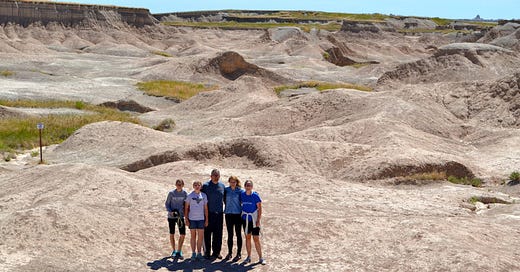Raising Heirs, Adopting Orphans
My family and I just returned from a two-week trip through the Midwest to see family and friends, as well as do a few "vacation-like" things along the way (Mt. Rushmore, The Badlands, The Corn Palace). Two weeks, 10 states, 3,500 miles, and 55 hours in a van together were as fun as they could be (most of the time), and while I'm glad to be back, I'm grateful to have had the time away.
During our trip, we were not immune to the disheartening news of the recent shootings in Minnesota, Louisiana, and Texas. As we listened on the radio and visited with relatives and others, it was not difficult to pick up on the discouragement and dismay from all that has been happening nationally.
While meeting with a good friend in Colorado Springs, he asked a desperate question: "What are you going to do in response to all this?"
I paused, for like most of us, I have felt helpless in thinking about "doing" anything that would elicit real change. Sure, I could post a passionate rant on Facebook or jump in on a protest march somewhere as part of the last of our travel plans, but how far would either of those go - really - toward bringing about a true long-term solution? I can pray - and have - but I confess I struggle in doing even that, as it seems such a small response in the face of such awful evil.
Almost apologetically, I looked at my friend, shook my head, and told him this: "I'm going to try to raise four girls and lead a school of 200 students in Bozeman, Montana, to love God and love their neighbors as themselves. I'm going to do all I can to make sure they read the greatest works of literature so as to learn not to be afraid of evil. And I'm going to teach them about the fallenness of our human condition and plead with them to embrace the hope of the Gospel to deal with it. That's it. That's all I got."
Robert Pogue Harrison, in the preface to his intriguing book, Juvenesence: A Cultural History of Our Age, writes:
"The greatest blessing a society can confer on its young is to turn them into the heirs, rather than the orphans, of history. It is also the greatest blessing a society can confer on itself, for heirs rejuvenate the heritage by creatively renewing its legacies. Orphans, by contrast, relate to the past as an alien, unapproachable continent - if they relate to it at all. Our age seems intent on turning the world as a whole into an orphanage, for reasons that no one - least of all the author of this book - understands."
Harrison's hope for humanity is straightforward:
"Youth has several virtues, yet providing for the future is not one of them...It is not thanks to children that our species has survived; it is thanks to their parents, teachers, leaders, and sages."
In solidarity with Dr. Harrison, I don't understand our culture's hell-bent attempts to orphan our children (literally or metaphorically), but as a Christian, as a father, and as a Headmaster of a classical Christian school, I want to raise heirs and adopt orphans as part of God's redemption of this ugly and broken world. I am called to model and teach love, "which comes from a pure heart and a good conscience and a sincere faith" (1 Timothy 1:5), the development of which takes work.
Sure, I'll post something on Facebook (starting with a link to this post) and gladly march with whomever will march with me to say that lives - black and white - matter. But rather than just protest bad behavior, I want to be at work in "the badlands" of the soul, to somehow help identify and crucify the evil within, for the flourishing of humanity and the renown of Jesus the Christ.
That's what I'm going to do.
That's it. That's all I got.




